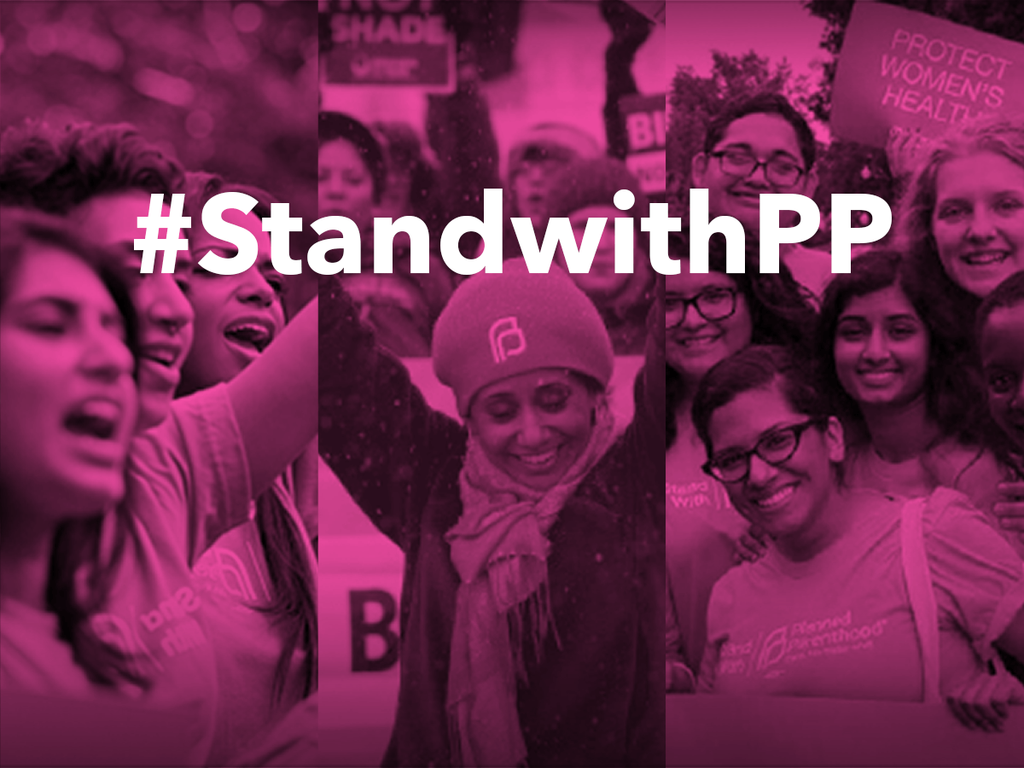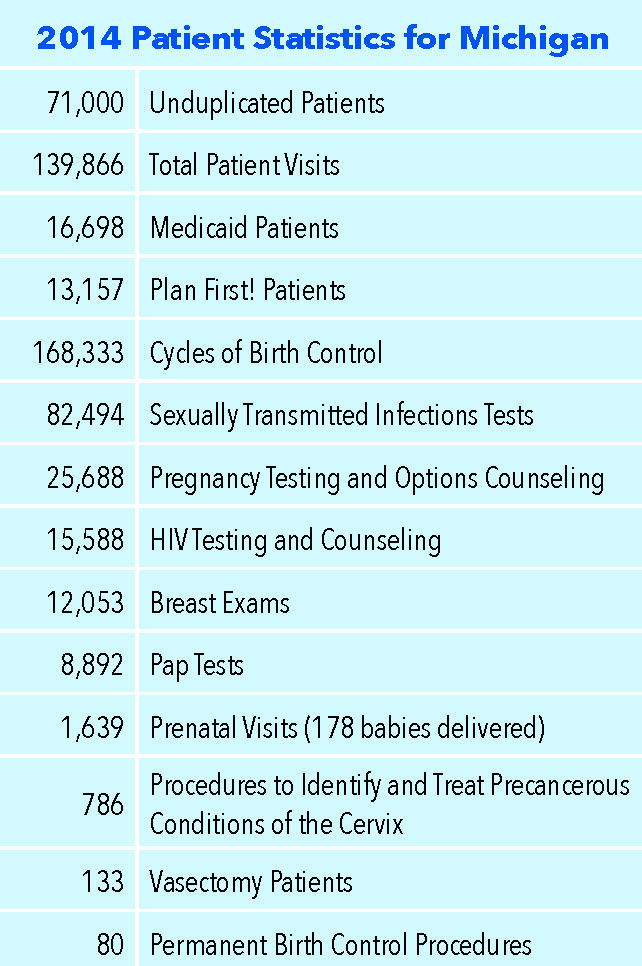While anti-choice activists try to fight the truth with misinformation, it’s imperative to defend the facts.
This post is not about abortion. It’s about people’s health and lives.
 I’m not shying away from the fact that abortion is a legal healthcare service, and that it accounts for 3 percent of the services Planned Parenthood provides. No one is denying that fact and we shouldn’t be afraid to talk about it. Abortion is a choice that every woman has the right to make for herself.
I’m not shying away from the fact that abortion is a legal healthcare service, and that it accounts for 3 percent of the services Planned Parenthood provides. No one is denying that fact and we shouldn’t be afraid to talk about it. Abortion is a choice that every woman has the right to make for herself.
But with a vote to defund Planned Parenthood looming in the U.S. Senate, expected on Monday, we must look at what’s at stake here — the 97 percent of essential healthcare services Planned Parenthood provides that protects the health and well-being of women, men and babies. Yes, babies.
The vicious attacks on Planned Parenthood being perpetuated by extremists are entirely focused on what they see as protecting the unborn, but what they won’t ever tell you about is the millions of Americans whose health and lives are being improved by Planned Parenthood. That wouldn’t fit their narrative.
So I’ll tell you how Planned Parenthood protects the health and lives of people in Michigan and across the country. Because if Planned Parenthood is defunded by a vote in Congress, many of those lives would be put at risk.
Nationwide, Planned Parenthood serves 2.7 million women and men every single year — essential healthcare services including cancer screenings, sexually transmitted infection (STI) testing and treatment, HIV/AIDS testing and counseling, well-woman care, prenatal care and more. In Michigan, there are 21 Planned Parenthood health centers serving areas as diverse as Detroit, Brighton, Flint, Grand Rapids and Traverse City. These health centers served 71,000 women, men and teens in 2014, and offered educational programs to another 20,000. More than half of these patients were at or below the federal poverty line.
The majority of Planned Parenthood’s patients — about 78 percent in Michigan — get no other healthcare services during the year, says Lori Carpentier, president and CEO of Planned Parenthood Mid and South Michigan.
The prevailing attitude is that with the Affordable Care Act, everybody has access to care but that’s untrue. A lot of people fall through the cracks, for a variety of reasons. Many of them are young women and others who don’t want to share with their families, or anyone else, that they’re seeking care. It’s not just high schoolers, either. We see a lot of college students who are covered by their parents’ insurance under the ACA but just don’t want their parents knowing their business on this.
Many of Planned Parenthood’s patients appreciate the organization’s non-judgmental, fact-based approach to care, she adds.
“We enlist women in their own care and we’re big on giving them all the information they need to make their own decisions,” Carpentier says. “People make personal choices and we’re good with that. People like knowing they’ll be embraced by their healthcare provider regardless of their choices.”
This extends to respecting people’s sexual orientation, identity and family. About 8 percent of Planned Parenthood’s patients are men, both heterosexual and homosexual. In addition to the STI testing and treatment it offers, Planned Parenthood was one of the first providers to test and care for patients with HIV and AIDS starting in 1984 — long before many local public health departments and other providers were offering that care. There’s simply no denying that these services are lifesaving, preventing the spread of HIV infection and protecting the health and lives of those already infected, because early and consistent treatment is essential. If you have doubts, just look what happened in one Indiana county when Planned Parenthood health centers were shut down: There was an immediate, widespread outbreak of HIV.
There’s also prenatal care, which many people don’t realize is available through some Planned Parenthood affiliates, including Michigan. Prenatal care is vitally important to protect a woman’s health and prevent birth defects in the baby. This service is available at Planned Parenthood health centers in Ann Arbor and Detroit, with hopes to expand to other locations in Michigan. According to Carpentier, Planned Parenthood expected to see 125 women under this program but has already seen 300 this year, demonstrating the compelling need — especially among low-income women.
If a woman comes to us with an unplanned pregnancy, we can help her sort through her options, give her a very safe place to have a discussion around her considerations and then help her carry out that choice. She can use our prenatal program, pregnancy termination or referrals for adoption. We’re the go-to place if you’re not sure how to handle a surprise pregnancy.
By offering affordable, expert prenatal care and regular maternal follow-up, Planned Parenthood can improve birth outcomes, reduce the number of low birth-weight babies and pre-term deliveries, and help women space future pregnancies through family planning services. In fact, Carpentier says, in Michigan Planned Parenthood does better than the national average on all outcomes. Plus, it offers companion support like stop-smoking programs and breastfeeding coaching. All of this leads to healthier babies and healthier moms.
If the health of women and babies isn’t compelling enough, there’s the financial impact of family planning services like those provided by Planned Parenthood.
“For every dollar you spend on family planning, you’ll save $6 next year in Medicaid costs,” Carpentier says. “That has to do with diverting unintended pregnancies, many of which didn’t have prenatal care and the outcomes aren’t wonderful. There isn’t another program that gives you that kind of direct return.”
 In Michigan, as in other states, Planned Parenthood provides a wide range of other services, as you can see in the graphic (click it to enlarge). It’s clear that abortion — which tax dollars already do not fund — is only a small percentage of the work Planned Parenthood does.
In Michigan, as in other states, Planned Parenthood provides a wide range of other services, as you can see in the graphic (click it to enlarge). It’s clear that abortion — which tax dollars already do not fund — is only a small percentage of the work Planned Parenthood does.
The Republican argument that if they’re successful defunding Planned Parenthood, they’ll make those funds available to other organizations that provide care for women is, frankly, ludicrous. There’s no infrastructure in place to serve those patients.
According to the Guttmacher Institute, Planned Parenthood health centers comprise 10 percent of all publicly funded family planning centers, but they serve 36 percent of all clients who obtain care from the country’s family planning health center network. Planned Parenthood is already providing a disproportionate amount of care to the people who can’t get it anywhere else. In addition, every Planned Parenthood health center serves an average of nearly 3,000 patients for contraceptive services each year, far more than other types of clinics.
Again, the notion that the Affordable Care Act means everyone is covered is flat-out wrong. As a huge champion of the ACA, I’ll be the first to admit there are still coverage gaps health reform advocates are working to close. It’s especially true in states that didn’t expand Medicaid, but even in those that did, like Michigan.
Although a small, early study showed that Healthy Michigan Plan patients weren’t having trouble getting in to see a doctor after the Medicaid expansion program was introduced, experts think we need three years of results to fully understand user rates, Carpentier says.
“Medicaid networks in most states are saying they’re worried about capacity moving forward,” she explains. “There aren’t enough physicians.”
According to the U.S. Department of Health and Human Services (HHS), over two-thirds of states are reporting difficulty in making sure there are enough providers, including specialty care — and especially OB/GYN care — for Medicaid enrollees.
Plus, there’s no guaranteeing that other providers will provide the kind of comprehensive, non-judgmental care available at Planned Parenthood — healthcare that’s grounded in educating patients in making the best decisions for themselves and their families. Healthcare that can actually save lives through proper prenatal care, cancer screenings, testing and treatment for HIV, and much more.
Looking at the big picture, Carpentier says she feels strongly about the “grand irony” of what extremists are doing in an effort to shut down Planned Parenthood.
The folks who are perpetrating what we’re experiencing as domestic terrorism really have an uninformed view of what the world would look like without us. If they’re interested in reducing the number of abortions that would happen, the opposite way to do that is to reduce the availability of birth control. Right now — and for the foreseeable future — Planned Parenthood is the best way to make sure birth control access is available around the country.
With a vote to defund Planned Parenthood expected in the U.S. Senate on Monday, there’s still time to take action. Contact your Congressional representatives, especially your Senators, right away and tell them why Planned Parenthood must keep its funding for essential, lifesaving healthcare services.
Then take any other action you can to stand with Planned Parenthood and make sure everyone you know is educated about the facts. By protecting Planned Parenthood, you might just save a life.
[Images courtesy of Planned Parenthood.]



